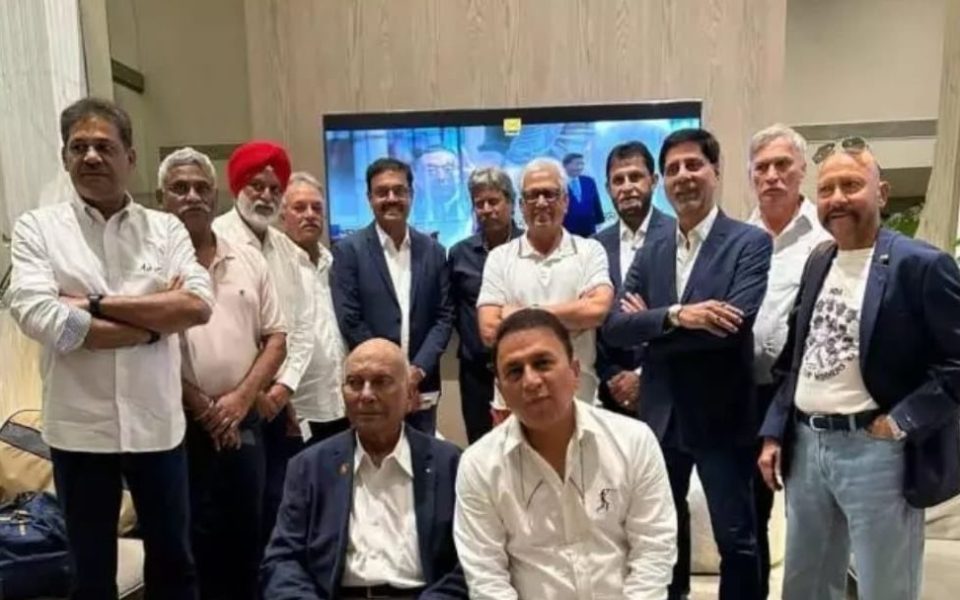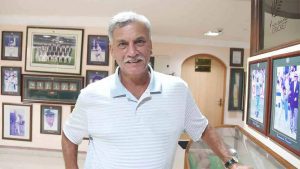
40 years of 1983 World Cup | India's triumph embodied team spirit, grit: Roger Binny

It’s been exactly 40 years since Kapil Dev’s men created history at Lord’s, but in so many ways, time seems to have stood still, too. Mohinder Amarnath’s dismissal of Michael Holding on June 25, 1983, to send a pleasantly stunned nation into the throes of ecstasy, is etched in the memories of millions of Indians, as is the image of Kapil holding aloft the World Cup trophy at the Lord’s balcony.
Podcast: Syed Kirmani goes down memory lane on 1983 World Cup triumph
India’s triumph had multiple heroes, not least their intrepid captain; prominent among the rest was a soft-spoken medium-pacer, a wonderful exponent of swing bowling who made optimal use of the conditions to finish as the highest wicket-taker of the competition, with 18 scalps.

Roger Binny, today the first full-time president of the Board of Control for Cricket in India with a World Cup winner’s medal around his neck, was a vital cog in the Indian wheel both at the World Cup and at the World Championship of Cricket in Australia in 1985, when India proved that 1983 was no fluke as they went undefeated on their way to a second major ODI title in less than two years.
Also read: New BCCI chief Roger Binny brings dignity, experience, expertise to the job
Stirring campaign
Binny was among those bracing for a weekend of festivities in Mumbai and Ahmedabad to usher in the 40th anniversary of that memorable day in London, yet made time to talk to The Federal on that epochal journey and what it has done for Indian cricket. All these years on, he says, the things that stand out from that stirring campaign are determination and team spirit.

“Our determination, it grew from match to match,” Binny begins. “I have never seen a team so determined at any point of time. It all started with the first victory, when we beat West Indies at Manchester (in India’s opening match, in which the late Yashpal Singh played a stellar hand). And the team spirit. These two things took us through all the way.”
Ask Binny about the president-World Cup winner fusion and he is typically modest and understated. “For me, it’s (the BCCI presidency) something which is up my alley, it (administration) is something I know. I had stints at the KSCA (Karnataka State Cricket Association), as a committee member, as the vice-president and then I became the president of the KSCA. Basically, I know what I have to do. I am happy that I am able to contribute, put my thoughts into the game, that’s important.”
“I am a cricketer,” he continues, outlining how he views his career of many parts, “and all my achievements are on the field. But it is also a big achievement for me to be the president of the BCCI. It’s something that never in my sweet dreams I thought I would achieve. And I didn’t work for it, really. I mean, I worked on the cricket field, but this just landed in my lap, this job. For me, like I said, being a cricketer, that’s my biggest achievement.”
Also read: Kapil Dev mocks mental health in viral video; says ‘don’t play IPL if you feel pressure’
Closely knit unit
The other day, R Ashwin spoke about teammates being just ‘colleagues’, not friends, but the Class of ’83 is a closely knit unit that goes beyond ‘colleagues’ category. “Winning that World Cup gave us so much pleasure that we can still relate to it,” Binny observes.
“Like I said, the team spirit and the way we approached the World Cup after that Manchester game, that is what is still holding us together. We became so close to each other. We trusted each other. We fought as a team on the field, we fought it out in the middle, we didn’t give up at any time. We kept pushing ourselves and it basically was team spirit and that’s why our bond is still so strong as teammates. We cherish all those moments. For all of us, I am sure, we share the same thoughts. It was a huge thing for everyone, this achievement by all of us,” he said.
“And it also changed the face of cricket. The West Indies were not an easy team to beat. They ruled over everybody in the previous two World Cups. At that time, there was no one really who challenged them. We did the unthinkable. All that contributed, that’s the reason why we are still together and we still crack a lot of jokes, have a lot of fun. We meet two or three times a year, which is really good. It’s something to look forward to.”
Also read: T20 WC: Virat Kohli didn’t have to prove himself, says BCCI chief Binny
Motivated young talent
A sea change in the attitude of, and towards Indians, was visible in the immediacy of 1983. One of the first emotions to flit through Binny’s mind after that historic win was pride at having won it for the nation.
“At that juncture, we were very happy for the people because they could walk with their heads held high,” he smiles. “I remember, before that, we were on the tour of Australia in 1980-81 and then I went and played the local leagues in England in 1982. You could feel that the Indians there, they had not much to be proud of. They were big fans, but they couldn’t relate to anything much. But ‘83 changed all that. They had something to relate to, something to hold their heads high and walk. That is what we did for them.”
“It also facilitated the hastening of the growth of the game in our country. It gave a lot of people, especially the cricketers, a lot of confidence. In fact, I have spoken to a lot of them… Especially a lot of them who played a few years after that, they were all – they were all kids at that time, guys like Rahul Dravid and VVS Laxman, they were not even teenagers. And they said that that win actually motivated them to play the game. And they got hooked on that World Cup that we won. Definitely, it motivated a lot of kids, it helped the game,” he said.
“It brought the game forward. It produced better cricketers. It also gave us a lot of confidence. And basically, a lot of things changed – for cricket and cricketers in the country. It took a bit of time, seven to eight years. It had a huge impact on the players, on the cricket board, on all things related to cricket.”
Also read: Members of 1983 World Cup winning team urge wrestlers not to take hasty decision
Word of advice
It’s been a decade since India have won any significant global crown, and the BCCI president had a few words of advice for the team that will have another go at the World Cup on their own turf in October-November. “What happened in 1983, when we finished up in England, was we had ideal players for those type of conditions,” he says.
“Our bowling strength was – we were not quick, but we could seam and swing the ball. (Balwinder Singh) Sandhu was there, Madan Lal was there, Mohinder (Amarnath), Kapil and myself. We all swung the ball. Those conditions were ideal for us to win. If you look at 1987, we lost (in the semifinal to England) because the bowlers were not able to get teams out. We had the batting, we had a strong batting line-up, but you also need bowlers who can bowl in such conditions and that didn’t happen till 2011.”
“In fact, the teams that we had before 2011 were very strong. I was under the impression that when Sourav (Ganguly) and Rahul and (Virender) Sehwag were all around, that team was the team to win the World Cup for the second time. But somehow that didn’t happen at that point of time.”
“What we need to do is to click at the right time. I think we are doing it a little bit too early, in the early games. We should start moving forward at maybe the halfway stage of the tournament. It’s very important, the timing of that. That’s the important thing, we have got to peak at the right time. We’ve got to put all else behind us – that we are playing too much cricket, that we are playing too much IPL. That’s an excuse. If you are fit, you should be playing all formats of the game. If you are going to say that there is too much of T20, then you don’t have to play that. You cannot win a cup by blaming others. The first important thing is to peak at the right time. The second thing is to keep a clear mind and play.”

